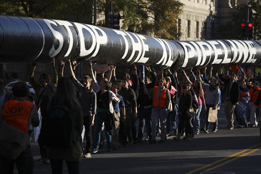Environmentalists Hail Decision to Deny Pipeline Permit; GOP Vows to Force Approval
 On November 6, 2011, Bill McKibben arrived at Washington, D.C.’s, Lafayette Park to protest the proposed Keystone XL pipeline, designed to carry oil 1,700 miles from Alberta, Canada, to refineries on the Gulf of Mexico. McKibben, a Vermont writer and environmentalist, had been one of 1,252 people arrested in front of the White House in August and September, protesting the same pipeline. He’d spent two nights in the district’s Central Cell Block, and now was back with thousands more people and a bold new plan.
On November 6, 2011, Bill McKibben arrived at Washington, D.C.’s, Lafayette Park to protest the proposed Keystone XL pipeline, designed to carry oil 1,700 miles from Alberta, Canada, to refineries on the Gulf of Mexico. McKibben, a Vermont writer and environmentalist, had been one of 1,252 people arrested in front of the White House in August and September, protesting the same pipeline. He’d spent two nights in the district’s Central Cell Block, and now was back with thousands more people and a bold new plan.“We can’t literally occupy the White House,” McKibben had told his fellow protesters, “so the next best thing is to surround it.” And that’s what they would do, encircle the White House in a “giant hug” to remind President Obama of his campaign promise to “end the tyranny of oil.” McKibben wasn’t sure how many people he would need to “hug” the White House, though, and was worried that he wouldn’t have enough.
It turns out he had plenty. At least 12,000, actually, making it the largest protest ever for an environmental cause outside the White House. The protesters circled the White House several times and in some places stood five deep. Speaking to the crowd, McKibben seemed pleasantly surprised that so many people had actually showed up. “We have been wondering if anybody was going to come,” he told them, perhaps a bit too honestly. “It’s been decades since there’s been a crowd like this outside the White House about something to do with the environment. So you have done a great thing today.”
Rejecting Pipeline Proposal, Obama Blames Congress
President Obama on Wednesday rejected, for now, the proposed Keystone XL oil pipeline, saying the $7 billion project could not be adequately reviewed within the 60-day deadline set by Congress. While the president’s action does not preclude later approval of the project, it sets up a baldly partisan fight over energy, jobs and regulation that will most likely persist through the November election.
The president said his hand had been forced by Republicans in Congress, who inserted a provision in the temporary payroll tax cut bill passed in December giving the administration only until Feb. 21 to decide the fate of the 1,700-mile pipeline, which would stretch from oil sands formations in Alberta to refineries on the Gulf Coast.
The State Department, which has authority over the project because it crosses an international border, said there was not enough time to draw a new route for the pipeline and assess the potential environmental harm to sensitive grasslands and aquifers along its path. The agency recommended that the permit be denied, and Mr. Obama concurred.
GOP mulls legislation to force Keystone approval
Republicans are mulling legislative options to circumvent the Obama administration’s Wednesday decision to reject the Keystone XL pipeline.
“This is not the end of the fight. Republicans in Congress will continue to push this because it is good for our country, it is good for the economy and it’s good for the American people,” House Speaker John Boehner (R-Ohio) told reporters Wednesday just minutes after Obama announced his decision to reject the project.
Boehner said Republicans are considering legislative options to ensure that the pipeline gets built, but he offered no specifics.
“All options are the table,” he said.
Anticipating that Obama would reject the pipeline, top Republicans on the House Energy and Commerce Committee met Tuesday to discuss legislative options. And a meeting with other GOP lawmakers on the panel is scheduled for next week.
Keystone XL is dead for now. What’s next?
As Juliet Eilperin and Steven Mufson report, the Obama administration is nixing the Keystone XL pipeline, which would’ve carried oil from Canada’s tar sands down to the Gulf Coast. So why did Obama reject it? And what happens next?
White House officials have long blamed Republicans in Congress for imposing an arbitrary deadline on the project that made a proper review all but impossible. Back in November, President Obama said that the Keystone pipeline should be rerouted in response to concerns that leaks could taint Nebraska’s water supplies. That process would’ve stretched into 2013. In last month’s payroll tax cut extension, however, Republicans included a provision that forced the administration to make a final decision by Feb. 21 of this year. White House officials bristled at what spokesman Jay Carney called “an attempt to short-circuit the review process.” And, in the end, the administration blocked the permits altogether.
Now, this doesn’t mean the pipeline is dead and buried. TransCanada is planning to reapply for permits once it comes up with an alternative pipeline route that doesn’t run through Nebraska’s Sandhills. This will delay the project even further, because the company will have to grind through the permitting process all over again, but it’s possible that the company could eventually win approval. TransCanada’s stock price initially plunged when rumors of the rejection first emerged, but has since slowly recovered.
You can return to the main Market News page, or press the Back button on your browser.

